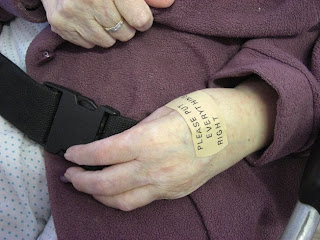In June, Phil and I had a fascinating, insightful interview with Dr Stephen Watkins, the Director of Public health for Stockport PCT. We discussed the independence of older people, dependency, care and control, choice, being a carer, social roles and patience.... Dr Stephen Watkins
Interview
8th June 2009 There is a gap between healthy life and life expectancy – and that gap is what we must reduce. It’s important that we narrow the gap to delay the onset of dependency, so that people enjoy life longer.
About a year ago I began to find that my right ankle was stiffening. It became difficult going up hills. I told my wife: ‘I feel like an old man.’ I went to a physio, who recognised some restricted movement at the site of an old fracture. She said: do exercises and force through the pain. I followed that advice and have been fine, although I’m slower uphill. Now, if I had been of the mindset that says ‘You’re 58, your life is ending’ I would’ve stopped going up hills. And then gradually I would have stopped walking altogether – a downward spiral.
We need to fight off the expectation of dependency. People have a right to care and will be dependent to a point, but we also have to accept people living with a degree of risk. We don’t stop the young climbing mountains – we must also trust the choices of old people.
This is the difference between care and control. Even when people have accepted a state of dependency they don’t have to lose all choice. You mustn’t become dependent before you really need to – and also when you are dependent, you still should be allowed to make choices, be trusted to take risks.
There needs to be policy that supports this, that recognises there’s a duty of care, but no right to force care on people. These are patients’ rights. In the case of allowing risk, the nature of that decision needs to be recorded. It must be shown that an individual was allowed to make a choice and that there wasn’t negligence, just the allowing of choice. It isn’t actually caring for someone to take away their choice, for instance taking them out of the environment they want to be in.
Being a carer can have a devastating effect on people. Often a carer can become as damaged as the person they are looking after. Sometimes you wonder if it wouldn’t be better if they weren’t caring – if they were able to just visit and be a supporter, friend, advocate. Better that than being trapped in a situation where all the opportunity for loving interaction is gone. Who benefits from that?
These are very personal things, affected by people’s individuality. I’m sure there are carers who would offer support, even if their independence is devastated. But it’s important for statutory bodies to realise that these people need support and can be neglected. This is especially the case in caring for sufferers of dementia who cease to be the person they were. Then the carer is grieving that loss alongside the stresses of the care. I’d like to see more support for carers but there’s a resource issue. That’s why it’s important life expectancy grows, but healthy life grows even more and so the dependency group gets smaller.
That gap isn’t understood. The assumption is that the number of dependent elderly is getting bigger, but this is based on a misunderstanding. The first time the population aged dramatically was when the last generation of large families came of age. Previously there had been high infant mortality so people had large families to compensate. With improvements in medical help the babies lived, but people didn’t change their behaviour and that cohort of unmarried women (the men died in the First World War) created the first ageing population in the UK at the end of the 20th Century. Predominantly female, dependent. People needing care increased because it was a particular demographic with certain needs. People gained a sense that this is what having an elderly population means. But the gender balance has changed, the older men have not been in a war, they’ve faced less occupational danger. People are living to be older, happier, which raises the possibility of narrowing gap. The pension crisis remains but the care crisis doesn’t have to.
The maths is very striking. If healthy life expectancy is 60 and life expectancy 70, then one seventh of the population will be dependent. If healthy life expectancy is say 85 and life expectancy is 90 then dependency drops to one in eighteen. It is absolutely affected by what people do in their 50s, 60s, 70s – we have to get to the people who would’ve stopped walking when faced with my bad ankle. That’s the beginning of dependency.
We need new social roles. At present there’s no protection against unfair dismissal over 65. Things like this undermine the social vision we have to have if we are going to deal with having an ageing population. We have to have a healthy ageing strategy as an economic necessity.
We need patience in public health, because it takes people so long to listen to us. Churchill said the American government will always do the right thing but only first trying every other option. Reactions to public health advice sometimes seem a bit like that. How long did it take to get the ban on smoking? We are very accustomed to patience. Ultimately the health of the people is such a powerful social value that it will in the end prevail.




.jpg)
